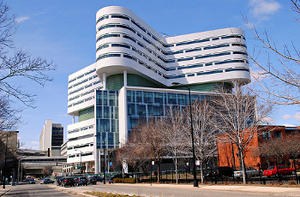BioterrorismChicago's new bio-attack response facility
Chicago is preparing itself for a biological attack with the recent unveiling of a new 40,000 square-foot, fourteen story state-of the-art medical decontamination facility; the new facility is fully equipped to handle a sudden influx of patients from a biological attack or other mass casualty incident

Rush University Medical Center, home of the rapid bioattack response center // Source: skyscraperpage.com
Chicago is preparing itself for a biological attack with the recent unveiling of a new 40,000 square-foot, fourteen story state-of the-art medical decontamination facility.
Last Friday the Robert R. McCormick Foundation Center for Advanced Emergency Response at the Rush University Medical Center opened its doors for the first time.
The new facility is fully equipped to handle a sudden influx of patients from a biological attack or other mass casualty incident. To help prevent the spread of infectious agents, the facility includes a series of interconnected pods that can be isolated. These pods contain their own decontamination showers and large storage tanks to collect contaminated water run-off from patients. “The center brings an unprecedented level of preparedness to Chicago in the event of a bioterrorist attack, a deadly pandemic or an industrial accident sending hazardous materials seeping into the streets,” said Dino Rumoro, the Rush University’s chairman of emergency medicine.
Rumoro added that the facility is unique to the United States.
He explained, “The concept of the new emergency room is not that novel, but putting together all the key elements of this center is novel. In an event of an emergency, we will closely coordinate all of our work with neighboring institutions and the city’s office of emergency management and communications.”
When not in use during a major attack, the new facility will function as a traditional emergency room with sixty treatment bays and a surge capacity of 133 percent.
“Since we are committed to providing unprecedented disaster response and due to our affiliation with the military, being able to conduct coordinated large-scale decontamination inside and outside the hospital is a major public health responsibility,” Rumoro said.
The Rush bio-decontamination facility was made possible thanks to a $7.5 million grant from the Robert R. McCormick Foundation along with grants from the Department of Defense and the Department of Energy.
